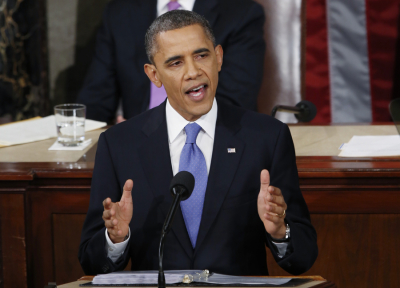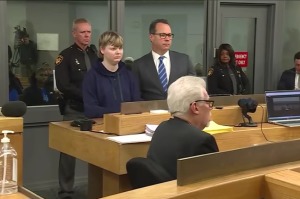State of the Union 2013 Transcript: President Obama's Full Speech Text

President Barack Obama delivered the State of the Union address on Tuesday night, setting a second-term agenda focusing heavily on the economy and jobs. He also called for the revival of what he called a "rising, thriving middle class," and pledged to fight for a higher minimum wage, as well as more investment in schools. Addressing deficit reduction plans, Obama asserted that he would attempt to achieve this through spending cuts and tax increases.
Here is the full transcript text of his speech as prepared for delivery and released by the White House.
Mr. Speaker, Mr. Vice President, Members of Congress, fellow citizens:
Fifty-one years ago, John F. Kennedy declared to this Chamber that "the Constitution makes us not rivals for power but partners for progress…It is my task," he said, "to report the State of the Union – to improve it is the task of us all."
Tonight, thanks to the grit and determination of the American people, there is much progress to report. After a decade of grinding war, our brave men and women in uniform are coming home. After years of grueling recession, our businesses have created over six million new jobs. We buy more American cars than we have in five years, and less foreign oil than we have in twenty. Our housing market is healing, our stock market is rebounding, and consumers, patients, and homeowners enjoy stronger protections than ever before.
Together, we have cleared away the rubble of crisis, and can say with renewed confidence that the state of our union is stronger.
But we gather here knowing that there are millions of Americans whose hard work and dedication have not yet been rewarded. Our economy is adding jobs – but too many people still can't find full-time employment. Corporate profits have rocketed to all-time highs – but for more than a decade, wages and incomes have barely budged.
It is our generation's task, then, to reignite the true engine of America's economic growth – a rising, thriving middle class.
It is our unfinished task to restore the basic bargain that built this country – the idea that if you work hard and meet your responsibilities, you can get ahead, no matter where you come from, what you look like, or who you love.
It is our unfinished task to make sure that this government works on behalf of the many, and not just the few; that it encourages free enterprise, rewards individual initiative, and opens the doors of opportunity to every child across this great nation.
The American people don't expect government to solve every problem. They don't expect those of us in this chamber to agree on every issue. But they do expect us to put the nation's interests before party. They do expect us to forge reasonable compromise where we can. For they know that America moves forward only when we do so together; and that the responsibility of improving this union remains the task of us all.
Our work must begin by making some basic decisions about our budget – decisions that will have a huge impact on the strength of our recovery.
Over the last few years, both parties have worked together to reduce the deficit by more than $2.5 trillion – mostly through spending cuts, but also by raising tax rates on the wealthiest 1 percent of Americans. As a result, we are more than halfway towards the goal of $4 trillion in deficit reduction that economists say we need to stabilize our finances.
Now we need to finish the job. And the question is, how?
In 2011, Congress passed a law saying that if both parties couldn't agree on a plan to reach our deficit goal, about a trillion dollars' worth of budget cuts would automatically go into effect this year. These sudden, harsh, arbitrary cuts would jeopardize our military readiness. They'd devastate priorities like education, energy, and medical research. They would certainly slow our recovery, and cost us hundreds of thousands of jobs. That's why Democrats, Republicans, business leaders, and economists have already said that these cuts, known here in Washington as "the sequester," are a really bad idea.
Now, some in this Congress have proposed preventing only the defense cuts by making even bigger cuts to things like education and job training; Medicare and Social Security benefits.
That idea is even worse. Yes, the biggest driver of our long-term debt is the rising cost of health care for an aging population. And those of us who care deeply about programs like Medicare must embrace the need for modest reforms – otherwise, our retirement programs will crowd out the investments we need for our children, and jeopardize the promise of a secure retirement for future generations.
But we can't ask senior citizens and working families to shoulder the entire burden of deficit reduction while asking nothing more from the wealthiest and most powerful. We won't grow the middle class simply by shifting the cost of health care or college onto families that are already struggling, or by forcing communities to lay off more teachers, cops, and firefighters. Most Americans – Democrats, Republicans, and Independents – understand that we can't just cut our way to prosperity. They know that broad-based economic growth requires a balanced approach to deficit reduction, with spending cuts and revenue, and with everybody doing their fair share. And that's the approach I offer tonight.
On Medicare, I'm prepared to enact reforms that will achieve the same amount of health care savings by the beginning of the next decade as the reforms proposed by the bipartisan Simpson-Bowles commission. Already, the Affordable Care Act is helping to slow the growth of health care costs. The reforms I'm proposing go even further. We'll reduce taxpayer subsidies to prescription drug companies and ask more from the wealthiest seniors. We'll bring down costs by changing the way our government pays for Medicare, because our medical bills shouldn't be based on the number of tests ordered or days spent in the hospital – they should be based on the quality of care that our seniors receive. And I am open to additional reforms from both parties, so long as they don't violate the guarantee of a secure retirement. Our government shouldn't make promises we cannot keep – but we must keep the promises we've already made.
To hit the rest of our deficit reduction target, we should do what leaders in both parties have already suggested, and save hundreds of billions of dollars by getting rid of tax loopholes and deductions for the well-off and well-connected. After all, why would we choose to make deeper cuts to education and Medicare just to protect special interest tax breaks? How is that fair? How does that promote growth?
Now is our best chance for bipartisan, comprehensive tax reform that encourages job creation and helps bring down the deficit. The American people deserve a tax code that helps small businesses spend less time filling out complicated forms, and more time expanding and hiring; a tax code that ensures billionaires with high-powered accountants can't pay a lower rate than their hard-working secretaries; a tax code that lowers incentives to move jobs overseas, and lowers tax rates for businesses and manufacturers that create jobs right here in America. That's what tax reform can deliver. That's what we can do together.
I realize that tax reform and entitlement reform won't be easy. The politics will be hard for both sides. None of us will get 100 percent of what we want. But the alternative will cost us jobs, hurt our economy, and visit hardship on millions of hardworking Americans.
So let's set party interests aside, and work to pass a budget that replaces reckless cuts with smart savings and wise investments in our future. And let's do it without the brinksmanship that stresses consumers and scares off investors. The greatest nation on Earth cannot keep conducting its business by drifting from one manufactured crisis to the next. Let's agree, right here, right now, to keep the people's government open, pay our bills on time, and always uphold the full faith and credit of the United States of America. The American people have worked too hard, for too long, rebuilding from one crisis to see their elected officials cause another.



























